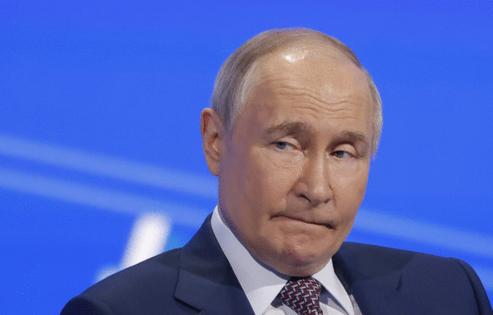Russia deepens its Taliban ties with eye on shared adversary ISIS
Published in News & Features
Nearly a year after Russian President Vladimir Putin called Afghanistan’s Taliban an “ally” in countering terrorism, Moscow lifted a two-decade-old ban on the group, aiming to bolster ties with Kabul to crush a joint enemy — the Islamic State.
The move was “no surprise,” given Putin has spoken of growing cooperation with the Taliban on terrorism, said John Herbst, senior director of the Atlantic Council’s Eurasia Center. Those comments were “specifically directed against ISIS,” which claimed responsibility for the bloody Crocus City Hall terrorist attack in March 2024, he said.
The decision will also “open the door for official recognition of the Taliban government,” which has remained a pariah since taking power in Afghanistan nearly four years ago, said Faizullah Jalal, an independent Afghan political analyst and human rights activist.
While no country has recognized the Taliban’s government, which has been condemned internationally for repeated human rights violations, the Foreign Ministry in Kabul on Wednesday said Russia had agreed to accept an ambassador-level diplomat in Moscow.
Russia’s cautious and slow-moving rapprochement with the Taliban, which Moscow had outlawed as a terrorist group in 2003, underscores that both sides see benefits in improving relations. For Russia, it’s crucial to protect against the threat of terrorism at home and in the wider Central Asia region. For the Taliban, it rewards efforts to gain international legitimacy and potentially brings foreign investment to help prop up the economy.
As part of those early endeavors, Sergei Shoigu, the secretary of Russia’s Security Council, made a rare visit to Kabul in November and spoke with numerous high-ranking officials. Russia also is one of only a few countries, including China, to have welcomed Taliban diplomats to its capital.
“Russia aims to build mutually beneficial ties with Afghanistan in all areas, including the fight against drugs and terrorism,” the Foreign Ministry in Moscow said in a statement after the court decision legalizing the Taliban.
The Kremlin didn’t respond to a request for comment about whether it intends to formally recognize the Taliban government.
A number of terrorist organizations operate out of Afghanistan, but the one that poses “greatest threat” at home and abroad is the Islamic State Khorasan, a regional offshoot of the larger ISIS group, according to a research paper from the Congressional Research Service in Washington. ISIS-K took credit last year for the worst attack in Russia in more than two decades, which killed at least 137 people.
The group was formed in 2014 or 2015, largely by defectors from the Afghan Taliban and Tehrik-e Taliban, which is dedicated to overthrowing Pakistan’s government.
ISIS-K’s strength was estimated at between 2,000 and 5,000 members as of April 2024. The US National Counterterrorism Center described the insurgent group as one of Islamic State’s “most lethal branches,” saying its militants have also killed or injured thousands of people in Afghanistan and Pakistan.
Improved ties with Kabul weren’t guaranteed for Moscow, given the complicated history between the two capitals. The Soviet Union invaded Afghanistan in 1979 and fought a decade-long war there against the Mujahedeen, which included some of the current Taliban leaders.
While trade increased 18% in the first eight months of 2024 from the same period a year earlier, it remained modest at about $227 million, according to Afghanistan’s Ministry of Industry and Commerce.
Normalizing relations could increase economic activity between the two countries. Russia’s Foreign Affairs Ministry said late last year it’s looking to hammer out projects in the energy and agriculture sectors with the Taliban, according to the Tass news agency, and by the end of last year Afghanistan had become the top buyer of Russian flour.
Moscow’s move to end the Taliban’s terrorism designation could persuade other countries in the region to follow suit. “Some of Russia’s close allies in Central Asia or in wider Asia are expected to follow suit if the Taliban are designated as a terrorist there, while other countries, especially in the West, will most likely reject it,” Jalal said.
Kazakhstan’s Deputy Prime Minister Serik Zhumangarin recently paid a visit to Kabul and discussed investment opportunities and expanding trade with high-ranking Taliban officials.
“The authorities in Kabul are a reality that needs to be reckoned with if one is to conduct a pragmatic and non-ideology-driven policy,” Russian Foreign Minister Sergei Lavrov said Wednesday, according to Tass. Lavrov also said Russia was advocating for the release of frozen Afghan state reserves currently in the U.S.
While the Taliban and Islamic State are both advocates of strict Sharia law, they’re also enemies, and have clashed frequently. The Taliban view ISIS-K as the primary threat to their rule. While they’ve intensified operations to combat the group, so far they’ve struggled to dismantle it.
The militant group has killed several senior Taliban officials since 2023. ISIS-K has also carried out cross-border rocket strikes against Uzbekistan and Tajikistan, attacks against the Russian and Pakistani embassies in Kabul, and an assault on a Kabul hotel frequented by Chinese nationals.
“Putin knows the potential terrorism threats emerging from Afghanistan toward Central Asia, which could jeopardize the entire region’s security or Russia’s interests in those countries,” said Jalal. “Building closer ties with the Taliban could help stop those threats.”
(Jon Herskovitz contributed to this report.)
©2025 Bloomberg L.P. Visit bloomberg.com. Distributed by Tribune Content Agency, LLC.







Comments